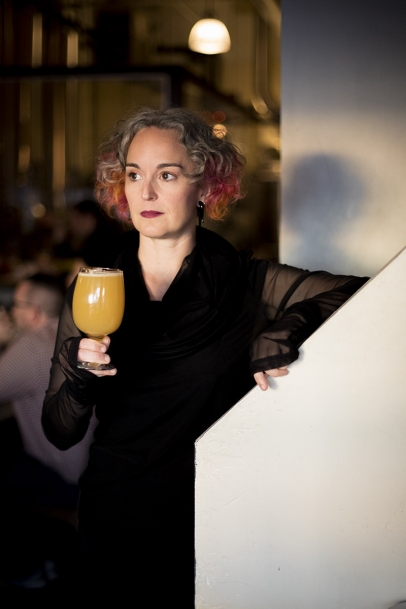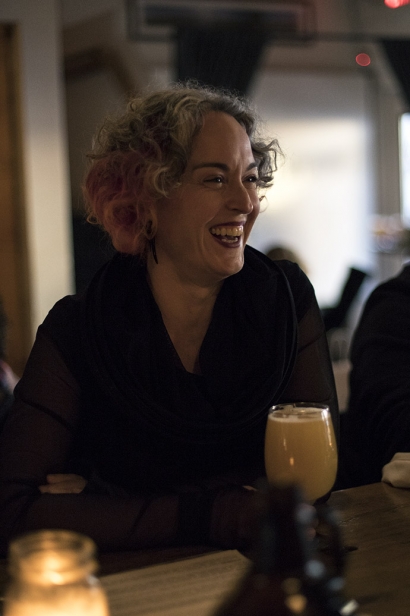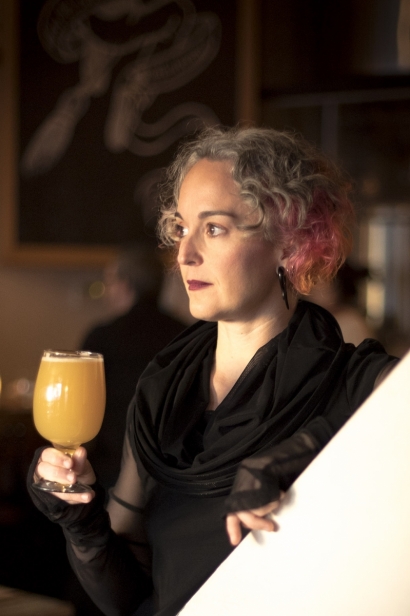Master Cicerone
Hipsters, hippies, students and yuppies are sampling a variety of beers named after air travel terms — Flight Delay IPA, Accelerated Stall Imperial IPA and First Class Craft Lager.
Downtown, a few blocks away, more beer aficionados are tasting, smelling and eyeing up the unique properties of brews with names such as Flying Monkeys Amber, Hoptical Illusion, Smashbomb Atomic and Juicy Ass — an American IPA.
Glaringly missing from both crowds is the ubiquitous older male Labatt Blue, Molson Canadian and Export drinker — they’re apparently hunkered down in the front of the TV at home where they enjoy their regular and comforting product, not much interested in exploring the rapidly and ever-expanding world of craft brewing in Canada.
“Give me an ‘Ex’ and let me watch the game,” a fellow named Kevin tells me when we hook up at a local watering hole. “I’m not interested in these craft beers. I want a beer to taste like a beer, not some fruity beer-infused thing.” Kevin, unlike millions of other Canadians, has not embraced the world of new taste and new experience. He’s a fairly typical beer consumer who came of age before the turn of the new century — he favours the same brand as his father and grandfather before him.
I want to introduce Kevin to Mirella Amato, master cicerone — the official term for a beer sommelier. The designation recognizes “an exceptional understanding of brewing, beer and pairing — combining outstanding tasting abilities with an encyclopedic knowledge of commercial beers,” according to the Cicerone Certification Program, the accrediting body.
Amato is the first Canadian to earn the master cicerone title. She is also a regular contributor to TAPS and the author of Beerology: Everything You Need to Enjoy Beer… Even More.
If anyone can help Kevin break out of his habit and try something new, it’s Amato. She lives for beer. In fact, the only other thing to compete with her beer affection is opera.
“Out of high school, I studied to be an opera singer and pursued that career path for 16 years,” Amato says. But even back then, “my true passion was beer.”
Born and raised in Toronto — known as one of the most multicultural cities in the world — Amato was exposed to a wide variety of foods and cuisines.
Beer-wise, she says, she was especially fortunate because beer and cask-conditioned ale were available in the city. Her passion for beer grew as she was exposed to a range of styles and flavours — and later, she wanted to share these discoveries with friends and acquaintances.
“It simply didn’t even occur to me that I could turn this passion into a career,” Amato says. “I used to say… ‘When I retire, I’ll write a book about craft beer.’ Had someone told me then that, 20 years later, I would not only write an award-winning book about beer, but dedicate myself full-time to promoting beer appreciation, I don’t think I would have believed them.”
Amato’s journey to becoming a beer expert began 10 years ago when she enrolled in the Cicerone Certification Program.
To reach the highest level, participants must complete four levels: certified beer server (first-level certification for those who work with beer); certified cicerone (certification for professionals dedicated to beer); advanced cicerone (a designation of distinctive expertise and tasting skill) and finally, master cicerone (the ultimate test of beer expertise).
The path to achieving the master cicerone level is arduous and gruelling, despite having to taste-test many brews.
The exams are only given up to two times a year, in Chicago, and exam spots are awarded by a lottery system.
The test itself takes place over two days, and includes multiple written, oral and tasting components. For the taste portion, the candidate must assess beer styles blindly.
And just passing isn’t good enough. To earn the master cicerone certification, a grade of 85 per cent or better is required.
While it’s been a long climb to the top of the cicerone ranks, Amato says it’s been an adventure unlike anything else she’s ever done.
“My job didn’t exist when I started in beer,” she said. “The cicerone certification program certainly didn’t exist. The notion of a ‘beer sommelier’ wasn’t something people could fathom, and it barely is now — how many restaurants have you seen with a cicerone on staff, or whose sommelier also had the cicerone certification?”
Amato’s biggest challenge starting out was acquiring the knowledge she needed to do her job. She travelled to Quebec, Illinois, California, Pennsylvania, New York and the United Kingdom to complete her studies.
The certification body doesn’t hold in-person courses or workshops — most of the knowledge students need to acquire is done through personal study. Whether that’s by downloading educational materials available on the cicerone certification program website, working in a beer-focused establishment or enrolling in independent workshops and courses, it’s up to the students to make sure they’re ready to pass the exams.
After completing all four levels of the certification, Amato had to find opportunities to work, explaining to people along the way what her specialization was, what a cicerone is and how a cicerone could add value.
“Fortunately, a lot of people got it and even more people wanted to learn about beer.”
And that’s a good thing, considering the growth of the Canadian beer industry over the past 20 years.
If you look back to the early 1980s, there were just 10 brewing companies in Canada. The three largest — Molson, Labatt and Carling O’Keefe — owned 96 per cent of the market. That started to change in 1982 when a pub owner in Vancouver, fed up with having his Carling-controlled taps run dry during a brewery strike in 1979, decided to brew his own ale. He figured he needed to sell one keg a day to break even. On his first day, he sold seven. The tipping point had arrived.
By the end of the 1980s, more than 40 new breweries had opened, most of them in British Columbia and Ontario. They produced a variety of styles — stouts, pale ales and Belgian wheat beers — that were basically new to Canada.
At the turn of the century, there were 163 breweries and brewpubs operating across the country. Ten years later, there were more than 300 craft breweries.
According to Beer Canada’s Industry Trends 2016 report, the number of brewing facilities across the country increased more than 20 per cent from 644 to 775 in 2016, with more than half of them being in either Ontario or Quebec.
But while the number of brewing facilities continues to grow, national production and national beer sales volumes have declined.
Still, with the increase in brewing facilities and more and more varieties being introduced almost daily, Amato’s work has shifted a little. She’s now less focused on guided tastings and more focused on consulting work.
“After achieving the title of master cicerone, I continued my studies, focusing on the science of brewing and sensory evaluation,” she says. “One thing I plan to expand this year is my off-flavour identification workshop, which is in increased demand.” Like wine, beer can often have unusual and surprising aromatic notes.
Often the only woman in the room at Toronto-area industry events, Amato says she was embraced by the beer industry and felt welcomed despite the overwhelming male-to-female ratio.
“The beer world in general is male-dominated, but I have never encountered difficulties working with craft brewers and cicerones,” Amato begins. “If anything, they’re delighted to see women take a professional interest in beer.”
Amato says there has been a dramatic increase in the number of women working in the beer industry. Unfortunately, she added, that hasn’t translated to more women in master cicerone positions. “When I achieved the title of master cicerone five years ago, there were two women out of six master cicerones — a full one-third,” she notes. “Today, we’re still the same two women, but now we’re out of 13.”
Amato still accepts the occasional speaking engagement, favouring opportunities where she can make connections between beer and other fields.
She loves events such as Toronto Beer Quest, an Amazing Racetype day that uncovered Toronto’s rich brewing history, or Hopera, which paired local craft beer with live operatic excerpts.
“There are so many ways to explain and communicate the complexities of beer,” she enthuses.
“The one thing on my wish list is to co-host a dinner with a master sommelier, with both of us proposing a pairing for each course. It would be a fun exploration of beer versus wine.”
Working with curious folks who want to sponge up every bit of information is the goal, but it doesn’t always work out that way. Amato recalls a time a man approached her before she was scheduled to give a talk.
“He told me he wasn’t attending because ‘I probably know more about beer than you anyway,’” before storming off.
“Ultimately, it didn’t bother me,” she says of his callous comment. “I live for learning and sharing and don’t concern myself [with] those with incurious attitudes.”
Amato knows she’s a trailblazer and wants to help others who harbour similar passions and interests. She said she benefitted from having a mentor — Italian beer expert Lorenzo Dabove — and believes she has to give back and help the next generation of cicerones.
“[Dabove] taught me so much, both about the openness of mind and the humility required to work in sensory evaluation, as well as the practical aspects of being a beer specialist and the challenges I would face,” Amato said. “My advice to people who want to pursue a career in beer is figure out what you do well and where your particular passions lie. The craft beer industry is still growing and there are many opportunities there.”







